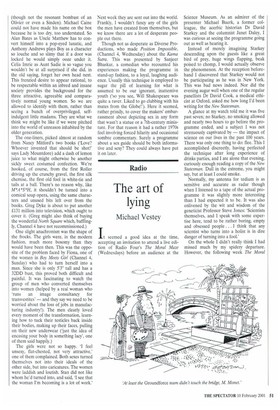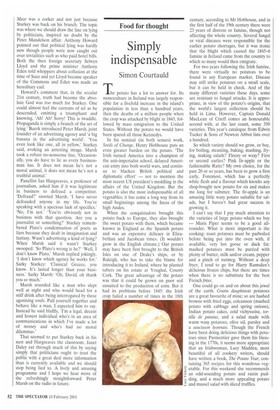Radio
The art of lying
Michael Vestey
It seemed a good idea at the time, accepting an invitation to attend a live edition of Radio Four's The Moral Maze (Wednesdays) before an audience at the
Science Museum. As an admirer of the presenter Michael Buerk, a former colleague, the acerbic historian Dr David Starkey and the columnist Janet Daley, I was curious at seeing the programme going out as well as hearing it.
Instead of merely imagining Starkey descending upon the guests like a great bird of prey, huge wings flapping, beak poised to chomp, I would actually observe the phenomenon. At the reception beforehand I discovered that Starkey would not be participating as he was in New York. This was bad news indeed. Nor did the evening augur well when one of the regular panellists Dr David Cook, a medical ethicist at Oxford, asked me how long I'd been writing for the New Statesman.
A glance at my watch told me it was five past seven; no Starkey, no smoking allowed and nearly two hours to go before the programme ended, and a subject I was not strenuously captivated by — the impact of science on our lives in the past 100 years. There was only one thing to do: flee. This I accomplished discreetly, having perfected the technique after long experience of drinks parties, and I ate alone that evening, curiously enough reading a copy of the New Statesman. Dull in the extreme, you might say, but at least I could smoke.
Normally, my antenna for tedium is as sensitive and accurate as radar though when I listened to a tape of the actual programme it was slightly more interesting than I had expected it to be. It was also enlivened by the wit and wisdom of the geneticist Professor Steve Jones: 'Scientists themselves, and I speak with some expertise here, tend to be rather boring, empty and obsessed people . . . I think that any scientist who turns into a holist is in dire danger of turning into a fool.'
On the whole I didn't really think I had missed much by my spidery departure. However, the following week The Moral
Maze was a corker and not just because Starkey was back on his branch. The topic was where we should draw the line on lying by politicians, inspired no doubt by the Peter Mande!son affair. Anthony Howard pointed out that political lying was hardly new though people were now caught out over trivialities such as who paid hotel bills. Both the then foreign secretary Selwyn Lloyd and the prime minister Anthony Eden told whoppers about collusion at the time of Suez and yet Lloyd became speaker of the Commons and Eden was made an hereditary earl.
Howard's comment that, in the secular 21st century, truth had become the absolute God was too much for Starkey. One could almost feel the currents of air as he descended, emitting a triumphant and knowing, `Ah! Ahl Sorry! This is twaddle. Propaganda is simply a branch of the art of lying.' Buerk introduced Peter Marsh, joint founder of an advertising agency and 'a big banana in the advertising world'. 'You even look like one, all in yellow,' Starkey said, evoking an arresting image. Marsh took a robust no-nonsense line, 'Occasionally, you do have to lie as every businessman has. It does not mean he's not a moral animal, it does not mean he's not a truthful animal.'
Panellist Ian Hargreaves, a professor of journalism, asked him if it was legitimate in business to defraud a competitor. 'Defraud?' snorted Marsh. 'I have never defrauded anyone in my life. You're speaking with a specious lack of specifics.' 'No, I'm not.' 'You're obviously not in business with that question. Are you a journalist or something?' Starkey remembered Plato's condemnation of poets as liars because they dealt in imagination and fantasy. Wasn't advertising a kind of lying? When Marsh said it wasn't Starkey swooped: `So Plato's wrong is he?"Well, I don't know Plato,' Marsh replied jokingly. 'I don't know which agency he works for.' Sarky Starkey: 'Classical Greece, you know. It's lasted longer than your business.' Sarky Marsh: 'Oh, David, oh thank you so much.'
Marsh sounded like a man who slept well at night and who would head for a stiff drink after being interrogated by these agonising souls. Pull yourself together and behave like a man, I expected him to say. Instead he said bluffly, 'I'm a legal, decent and honest individual who's in an area of communications in which I've made a lot of money and who's had no moral dilemmas.'
That seemed to put Starkey back in his nest and Hargreaves the classroom. Janet Daley cut through much of this by saying simply that politicians ought to trust the public with a great deal more information than is currently available and we should stop being lied to. A lively and amusing programme and I hope we hear more of the refreshingly straightforward Peter Marsh on the radio in future.



































































 Previous page
Previous page